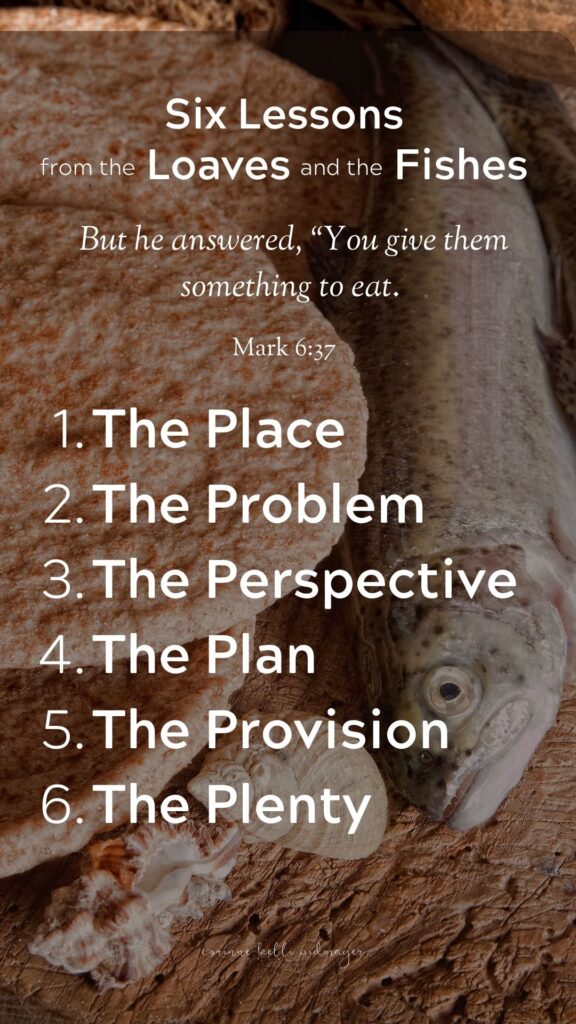But he answered, “You give them something to eat. (Mark 6:37)
The story of the loaves and the fishes from Mark 6:31-44 has so many lessons. How many times have you read the story, inspired by the miracle, but seen little in relation to your own life? Here are six lessons I gleaned–lessons about our place, problems, and perspective and God’s plan, provision, and plenty.
The Place
Jesus and the disciples had been ministering, and Jesus said they needed to rest awhile. Verse 31 indicates they hadn’t had time to eat. They left in a boat to getaway; but as they were leaving, the crowd saw them and followed them. By the time they landed, a crowd was waiting.
Jesus felt compassion for the people. They were unlearned in the ways of God. His approach to the problem was to teach. Feeling sorry for them was not enough. Jesus took action. Jesus taught for a long time.
The Lesson 1: Sometimes we are put in a place to care for others' needs even if we are tired and need rest.
The Problem
It was late in the day, and they were out in the middle of nowhere. Remember, the disciples had not eaten. The disciples said Jesus should break up the meeting and send the people home to eat.
Now, Jesus knows everything so He was well aware that people were hungry. And it is possible that the disciples had compassion on a hungry crowd. But I also wonder if it’s possible that the disciples were worried about their own stomachs. After all, they hadn’t eaten either. So, perhaps in a “show” of compassion for others, they were attempting to get their own needs met.
How often are we guilty of this? If we can get our own needs met by demonstrating concern for others, then we can appear unselfish when we are really meeting our own selfish needs.
The Lesson 2: God says we should put others before ourselves. He isn't fooled by phony compassion.
The Perspective
But Jesus turns the situation back on the disciples and says, “You feed them.” What lesson is Jesus trying to teach here? Perhaps, when we focus on taking care of others first, our own needs get met in the process.
The disciples had an earthly perspective. They saw a lot of people who were hungry and no markets in sight. God’s economy is not the same as man’s economy. The world says it’s a “dog eat dog world,” “every many for himself,” and “only the strong survive.” But God’s economy says that in our weakness, He will be our strength. (II Corinthians 12:9)
The disciples’ response to Jesus is faithless. “Really, Lord? How are we supposed to feed them? You want us to go buy bread? That would take six month’s of wages? Do you know how much bread that is? Everyone would barely get a bite? Do you know how much money we have (don’t have) in our account? Do you really think that’s going to be enough bread to feed this hungry crowd? If we spend all our money on them, what are we going to eat?” Obviously, I’m expanding the text here, but their question to Jesus seems sarcastic to me, and the underlying meaning might be, “What about us, Lord? Don’t you care about us?”
The Lesson 3: An earthly perspective won't provide an answer; we need to keep a heavenly perspective.
The Plan
But Jesus didn’t send them out for bread. He taught another lesson, only this time by example not preaching. He could have reminded them about all the people He had healed and the miracles He had performed: calming a storm, casting out demons, healing a woman who had been bleeding for twelve years, and raising Jarius’ daughter from the dead. But those were miracles of great proportion dealing with an individual or circumstance. This miracle would be about provision—ongoing provision—for simple daily needs.
All Jesus said was, “What do you have?” What do you have you can use? Give it to Me.
The disciplies located five loaves of bread and two fish. Imagine the disciples’ chagrin. God told them to feed a crowd of people, and all they could find were a few loaves and fish. Was it even worth showing such a small offering to Jesus? How inadequate. What was the point?
The Lesson 4: God always has a plan. He can take whatever we have and multiply it, if we give what we have willingly to help others.
The Provision
Next he told the people to recline—rest, sit, relax. Wait! We have a lot of people to feed. Shouldn’t we be working, organizing? No. When we give what we have to God, He does the work. Our part has been done in surrendering what we have to give; He provides. All that was left for the people to do was wait. They waited in an orderly fashion. This indicates obedience and trust.
Jesus prayed; He gave thanks. He began providing food by breaking the bread, and God continued to provide until everyone’s appetite was satisfied. All that was left for the disciples to do was distribute what had been provided—to serve.
The people on the edges of the crowd waited because it would take a while for twelve disciples to distribute food to all those people. And what did the people do while waiting for provision? They reclined. They rested easily because they knew provision was on its way. Everyone’s needs were met because what was available was surrendered to God. And the disciples were God’s servants, distributing what was provided.
The Lesson 5: Pray; give your concerns to God. Let Him know your needs. Then rest in Him while you wait faithfully for the answer.

The Plenty
Now the disciples probably had to wait to eat until all 5,000 plus people were served, but they eventually got to eat. After all, there were twelve baskets full of food left over when they finished serving. Twelve baskets. Twelve disciples. Coincidence? No, God doesn’t do coincidence. The disciples’ provision for their own needs was abundant.
God wants us to give what we have to Him so He can use it in service to others. And He will take care of all our needs. He is Jehovah Jireh.
Give God what you have—time/availability, a willing heart, your talents, and ability to learn new things. God will provide what is needed. Then you can serve Him. He knows your place. He knows your problem. You need proper perspective to see God’s plan, provision, and plenty.
Give what you have. Wait quietly. Pray and give thanks. Expect the provision. That’s the model.
The Lesson 6: God will supply all your needs according to His riches, and His riches are limitless. He is a God of abundance.

